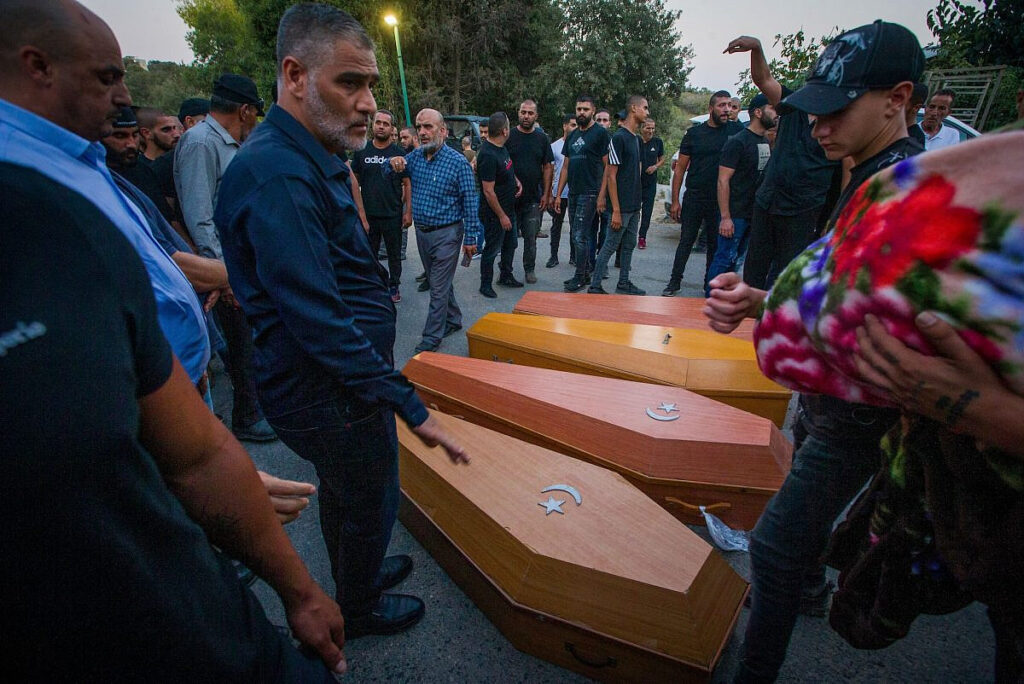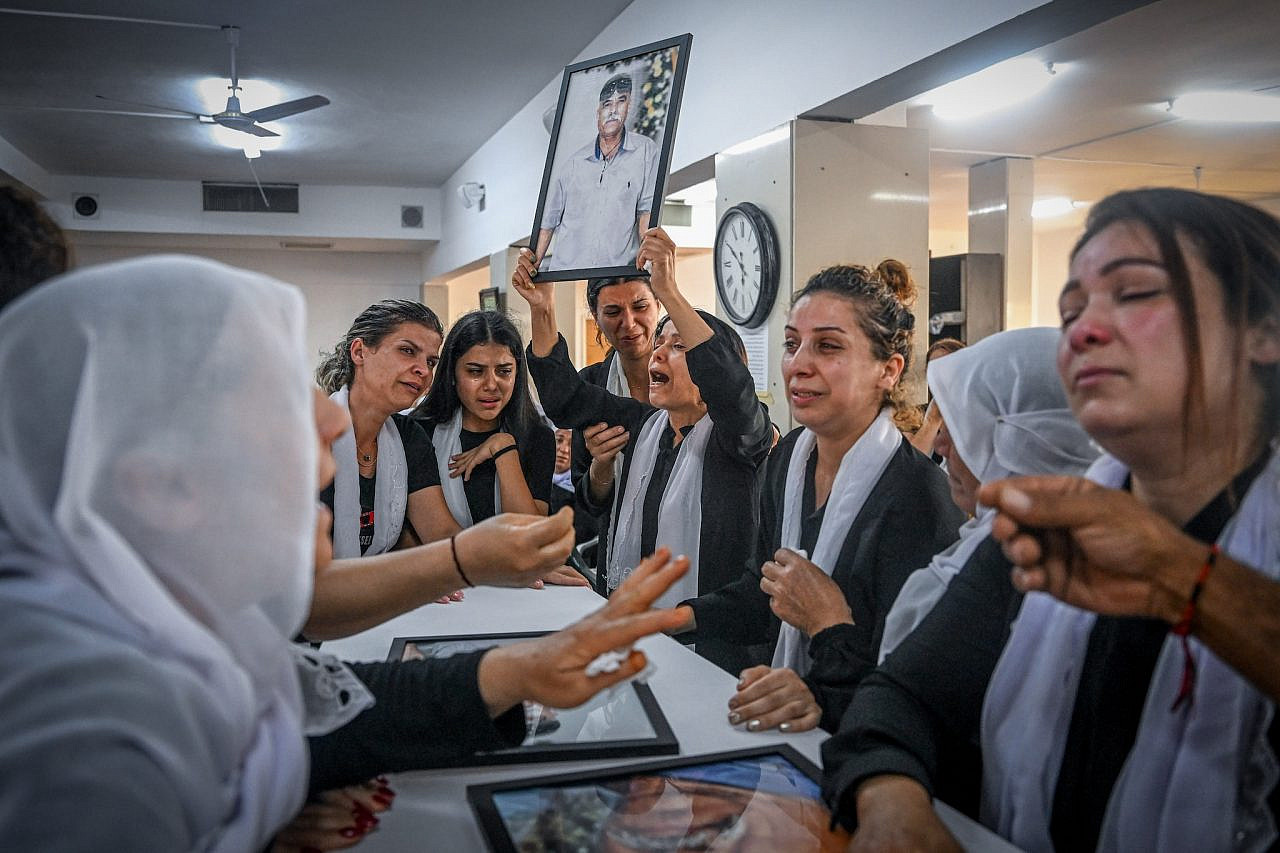Abandoned by the State, Palestinian Citizens of Israel Face Record Crime Wave
PALESTINE - ISRAEL, 3 Jun 2024
Baker Zoubi | +972 Magazine - TRANSCEND Media Service

Family and friends attend the funeral of five Palestinians who were shot to death in the Bedouin town of Basmat Tab’un on 29 Sep 2023. (Flash90)
Amid a proliferation of weapons and worsening police negligence, violence by criminal organizations in Arab towns has reached historic levels.
30 May 2024 – “If I can stay with my family abroad, I’ll be able to raise my children normally. But if I have to return to Israel, I’ll turn my children into criminals.” A. is a Palestinian citizen of Israel, who has been pursued by a criminal organization and is now trying to leave the country with his family. “In our reality today, you have to be a criminal in order to survive, and it’s clear that the situation will get worse in the coming years.”
Some may say this is an exaggeration, and insist that Palestinian citizens of Israel lead normal lives, better than most Palestinians and Arabs. But in addition to widespread discrimination against and increasing political persecution of Palestinian citizens by the Israeli government, the number of Palestinian victims of organized crime continues to rise at a frightening rate.
According to a Taub Institute study, the Arab community in Israel had the third-highest murder rate among OECD countries in 2019 — just below Mexico and Colombia — with 11.11 murders per 100,000 citizens, a figure that tripled for those between the ages of 20 and 34. The study also noted that murders in Palestinian communities more than doubled, from 109 cases in 2022 to 233 in 2023, with a consistent climb in the murder rate every month through last September.
“There are few villages that have not experienced shootings, or where there are no threatened families, demands for protection money, car bombings, and so on,” said Rawyah Handaqlu, an attorney who heads the Emergency Headquarters to Combat Crime in Arab Society — an emergency body established last September by the High Follow-Up Committee and the National Committee of the Heads of Arab Local Authorities.
“It’s not just about the number of fatalities,” she explained. “Entire families have left the country or changed their place of residence, others are hiding in their homes, not to mention the daily explosions, the burning of cars, and all those injured in the attacks, which sometimes are not even reported in the media.”
Since the beginning of this year, 86 Arab citizens have been murdered — a startlingly high number that suggests the murder rate this year will be similar to last year’s. Yet although the numbers are roughly the same, criminal organizations have recently escalated their tactics, publishing lists of murder targets, abducting civilians, and hiding the bodies of their victims.
“Today, for example, we no longer hear about a stabbing: there are now anti-tank missiles, mortar shells, and drones. In the absence of the law, things are developing horribly,” Handaqlu warns.
“The heads of the criminal organizations know exactly how the police work, and they plan their work accordingly, so you feel that things are coordinated,” A. said. “In the absence of any real deterrent, the pace of their activity only increases.” He notes that in past years, gunmen would burn their getaway vehicle in a remote area in order to hide and destroy any evidence. But now, they will blow it up near the crime scene — and if they previously limited their attacks to certain targets, now they will go after the target’s family as well.
“I’m not surprised that there are some who have killed 10 or 20 people in recent years,” A. told +972. “No one prosecutes them, most murder cases are closed or dragged out, and all the evidence from security cameras, witnesses, fingerprints, and traces is ‘wasted’.” He has no hope that the situation will improve; in the coming years, A. warns, “only your fists will protect you.”
‘We hold the police unequivocally responsible’
In the media, political discourse, and among the Israeli public, Druze communities are often seen as separate from the Palestinian minority — a perception that some Druze reinforce themselves, especially during periods of heightened security, when they call attention to the fact that Druze citizens serve in the army and security services. But when it comes to organized crime, as well as house demolitions and other forms of discrimination, they face the same threats as the rest of Palestinian society.
In recent months, the murder rate has significantly increased in Druze communities, including Yarka, Isfiya, Abu Snan, and others. The village of Isfiya alone witnessed five murders between April 12 and May 12, with two of the victims found dead long after they had been kidnapped. In response, according to journalist and social activist Wissam Ghoutani, many village residents came out to protest violent crime and police inaction.

“We hold the police unequivocally responsible, as the institution responsible for our security, and who have negligently allowed things to deteriorate here for years,” Ghoutani affirmed. Five people were killed in Isfiya and not a single suspect was arrested. We only hear that ‘the police are opening an investigation.’”
Ghoutani conceded that other factors — including unemployment, lagging public investment in education, sports, and infrastructure, and even culture — contribute to crime. He also advocated for renewing the activities of reconciliation committees, a traditional forum for mediating disputes in Arab society, and to grant them the authority to address crime head-on.
“But the war between criminal organizations in Arab society and the chaos that exists today are greater than anything else [facing the Arab community],” he insisted, “and it is the police, as a powerful state security apparatus, that is supposed to deal with them.”
A proliferation of weapons
Following the October 7 attacks, National Security Minister Itamar Ben Gvir moved quickly to expand gun ownership among Jewish civilians, and recently celebrated the approval of more than 100,000 new gun licenses. With more weapons on the street, according to Handaqlu, gun violence at the hands of criminal organizations has also proliferated. “The weapons distributed today under the pretext of Jewish security will be used against Arabs,” she predicted, “especially with the deteriorating economic situation and the chaos of the war.”
Handaqlu’s work is only made more difficult by Ben Gvir and the lack of cooperation from his ministry — a departure from the ministry’s role under former Internal Security Minister Omer Barlev and his deputy Yoav Segalovich, who collaborated with Arab Knesset members and heads of Arab municipalities. “Unfortunately, the minister incites against Arab society or uses organized crime as an excuse to attack it, and he has even gutted existing government programs for Arab society.”
In March 2023, for instance, Ben Gvir decided to freeze the ministry’s cooperation in the “Stop the Bleeding” program, an initiative designed to deal with the rising violence and crime in Arab society. Forced to come up with alternative solutions, Handaqlu convened a roundtable of civil society institutions and representatives from several ministries, and has continued to work with local authorities to help improve their response to criminal activity and assist those affected by it.
On the problem of police negligence toward crime in Palestinian communities, Handaqlu admitted that “we must cooperate with them, regardless of the existing mistrust, because they are responsible for our security.” But she also acknowledged that the police are subject to policies dictated by the government, which currently seems bent on making the situation worse.
The Knesset is currently preparing to pass the Law to Expand the Means to Combat Criminal Organizations, which would give Ben Gvir, as national security minister, the sole authority to use anti-terrorism tactics in the fight against domestic crime. This would amount to a remarkable expansion of his powers, which he is almost certain to use against — not for the benefit of — Arab citizens.
“If this law had passed before October 7,” Handaqlu suggested, “perhaps the minister would have declared the entire Arab society a terrorist organization.”
________________________________________________
 Baker Zoubi is a Palestinian journalist from Nazareth who has been working in journalism since 2010. He also works as a researcher and editor for television programs on the Makan and Musawa channels. Recently Baker started writing for Local Call.
Baker Zoubi is a Palestinian journalist from Nazareth who has been working in journalism since 2010. He also works as a researcher and editor for television programs on the Makan and Musawa channels. Recently Baker started writing for Local Call.
Tags: Anglo America, Colonialism, Crimes against Humanity, Ecocide, Ethnic Cleansing, Famine, Gaza, Genocide, Genocide Convention, Hamas, Hunger, International Court of Justice ICJ, International Criminal Court ICC, Israel, Israeli Apartheid, Israeli occupation, Massacre, Palestine, Protests, Rafah, Students Anti-Genocide Gaza, USA, United Nations, War crimes, West Bank, Zionism
Join the BDS-BOYCOTT, DIVESTMENT, SANCTIONS campaign to protest the Israeli barbaric siege of Gaza, illegal occupation of the Palestine nation’s territory, the apartheid wall, its inhuman and degrading treatment of the Palestinian people, and the more than 7,000 Palestinian men, women, elderly and children arbitrarily locked up in Israeli prisons.
DON’T BUY PRODUCTS WHOSE BARCODE STARTS WITH 729, which indicates that it is produced in Israel. DO YOUR PART! MAKE A DIFFERENCE!
7 2 9: BOYCOTT FOR JUSTICE!
DISCLAIMER: The statements, views and opinions expressed in pieces republished here are solely those of the authors and do not necessarily represent those of TMS. In accordance with title 17 U.S.C. section 107, this material is distributed without profit to those who have expressed a prior interest in receiving the included information for research and educational purposes. TMS has no affiliation whatsoever with the originator of this article nor is TMS endorsed or sponsored by the originator. “GO TO ORIGINAL” links are provided as a convenience to our readers and allow for verification of authenticity. However, as originating pages are often updated by their originating host sites, the versions posted may not match the versions our readers view when clicking the “GO TO ORIGINAL” links. This site contains copyrighted material the use of which has not always been specifically authorized by the copyright owner. We are making such material available in our efforts to advance understanding of environmental, political, human rights, economic, democracy, scientific, and social justice issues, etc. We believe this constitutes a ‘fair use’ of any such copyrighted material as provided for in section 107 of the US Copyright Law. In accordance with Title 17 U.S.C. Section 107, the material on this site is distributed without profit to those who have expressed a prior interest in receiving the included information for research and educational purposes. For more information go to: http://www.law.cornell.edu/uscode/17/107.shtml. If you wish to use copyrighted material from this site for purposes of your own that go beyond ‘fair use’, you must obtain permission from the copyright owner.
Join the discussion!
We welcome debate and dissent, but personal — ad hominem — attacks (on authors, other users or any individual), abuse and defamatory language will not be tolerated. Nor will we tolerate attempts to deliberately disrupt discussions. We aim to maintain an inviting space to focus on intelligent interactions and debates.
Read more
Click here to go to the current weekly digest or pick another article:
PALESTINE - ISRAEL: